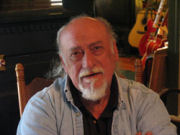|
Ricardo -> RE: does age reflects on studying flamenco? (Jan. 29 2007 9:05:53)
|
quote:
Sometimes I find myself not quite getting the variations of the rhythmns I hear from accomplished flamenco guitarists...could it be my head is so filled with the thousands of tunes I've played throughout the years from early 'make believe ballroom' days to rock etc...? I don't know. What have others experienced who have come to flamenco with backgrounds in other genres?
I have noticed this and thought a lot about it. We hear a couple of notes of a melody, and it might sound vaguely familiar, so our musical brain fits those notes into the timing place it thinks they belong. My idea about it is about how the ear, your personal perception, of a melody or rhythm sits against your internal clock. What I mean is some folks can "sense" the rhythm is off, but they don't know exactly what is "on" or "off" about it.
As an experiment, if I have a student making a typical timing mistake, I will play the melody the way I think they are perceiving it against my foot, or compas track, or metronome. If they think that is it, I say "good", because that is "wrong". Then I play it the right way to see if they pick up on the difference.
In most cases a light bulb goes off and they "hear" the melody the way it should go, and it suddenly sounds "weird". So they have to relearn the melody correctly. It can happen with just 2 or 3 notes. In fact, that is the number of notes that can mess it up for an entire phrase. Focus on accenting a specific note that falls on a beat or something, usually fixes the problem. But some students practice the wrong thing so many times, and drive it in so hard that to "fix" it means, learning it all over like it is a completely different falseta.
There are of course more rare cases where the student simply can't hear a difference, both ways sound exactly the same, because they don't really have the internal clock developed at all. Still others simply don't care so much about timing, and think it is "ok" to do things their "own way". Everyone's "ear" for rhythm develops differently. But I am convinced that learning how to place a melody deliberately in to the rhythm various ways, is the best way to develop control over rhythm, and also figuring out stuff by ear more correctly, more quickly too. But I admit it is challenging.
Ricardo
|
|
|
|

